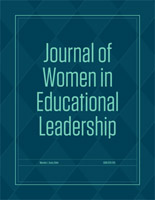Educational Administration, Department of

Journal of Women in Educational Leadership
Date of this Version
6-2020
Document Type
Article
Citation
Journal of Women in Educational Leadership, 2020
doi: 10.32873/unl.dc.jwel.194
http://digitalcommons.unl.edu/jwel/
ISSN 2379-2191
Abstract
In 1874 Phebe was unanimously chosen as the city superintendent of schools by the Davenport board of education (Barnhart, 1947, p.25). The board offered her a salary considerably less than that of her male predecessor; and, she rejected the offer until they agreed to a pay increase (Phebe Sudlow, n.d.). She purportedly told the board members, “If it was lower because of my qualifications, I will understand. If it is because I am a woman, however, I cannot accept it” (Christian, 1989, p.6). Phebe served as superintendent for Davenport Public Schools from 1874-1878. The rise of Phebe Sudlow from first female principal to first female superintendent gave the Women’s Suffrage Movement in Iowa a boost and garnered national attention for the city of Davenport (Petersen, 1970, p.35). In 1878 Phebe accepted the appointment of Lady Professor of English Language and Literature in the State University (present-day University of Iowa) at the full salary of $1,700. In 1878, The Educational Weekly published an article on Phebe’s promotion to Lady Professor of English Language; and, its editors had the following to say about her: “Miss Sudlow carries with her to her new field of labor the respect, friendship, and good will of an entire corps of teachers. Davenport’s loss is Iowa’s gain” (Vaile & Winchell, 1878, p.346). Phebe was the first female professor of the University, earning a salary equal to that of her male colleagues (Phebe Sudlow, n.d.).


Comments
Copyright 2020 Veronika Cummings